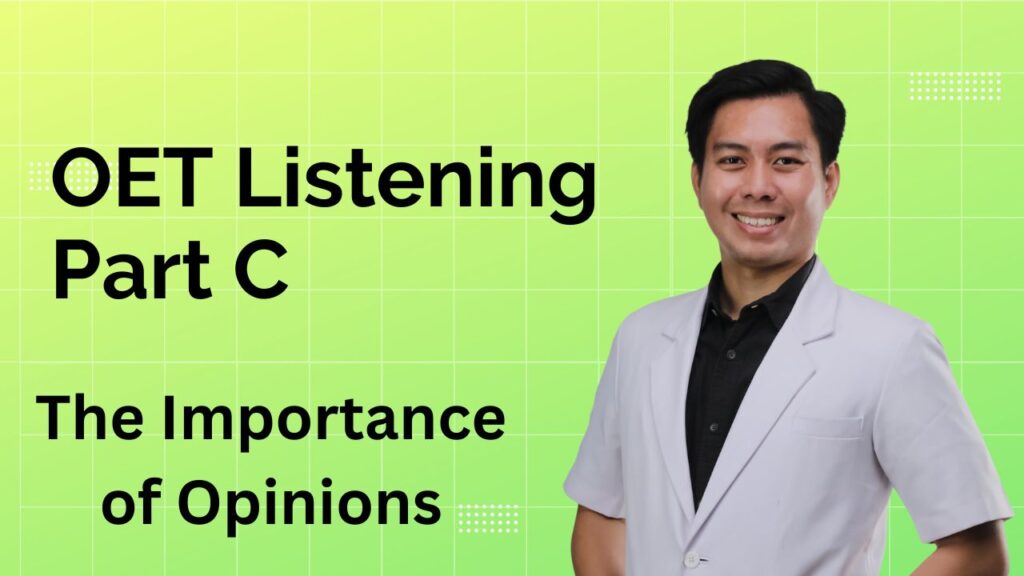OET Listening Part C: The Importance of Opinions
OET Listening Part C: As an aspiring healthcare professional, it is essential to master the Occupational English Test (OET) to communicate effectively with colleagues and patients. One of the most challenging parts of the OET is the Listening section, specifically, Part C, which focuses on listening to opinions.
Test-takers must listen to a recorded dialogue between two healthcare professionals discussing a particular topic related to the healthcare industry as part of the requirement in Part C. They must then answer six multiple-choice questions that assess their understanding of the opinions expressed by the speakers.
Why is Part C so Important?
1. Healthcare is a Collaborative
Why is Part C so important, and why do healthcare professionals need to be proficient in understanding and expressing their opinions? The answer is simple: healthcare is a collaborative field that requires effective communication between professionals and patients.
Patients often come to healthcare professionals seeking advice and guidance on their health issues. As healthcare professionals, it is crucial to express your opinions on the best course of action for your patients, taking into account their medical history, current health status, and personal preferences.
Furthermore, healthcare professionals must collaborate with their colleagues to provide the best care for their patients. In such scenarios, it is essential to express their opinions clearly and confidently, while also respecting and considering the opinions of others.
2. Healthcare Professionals Develop their listening skills
Part C of the OET helps healthcare professionals develop their listening skills, particularly regarding opinions. It tests their ability to understand the opinions expressed by their colleagues and to identify the reasoning behind those opinions. It also helps test-takers develop critical thinking skills by analyzing different perspectives on a particular healthcare issue.
Part of the testing focus in Listening Part C is to check your understanding of opinions. On your work day, you will hear many different opinions from colleagues and patients. Often the presentation of one opinion will lead to a response with a second opinion which may agree or disagree with the original opinion. To interact confidently in the English-speaking healthcare environment, you will therefore need to be able to identify when an opinion is being given and what the opinion is.
Example of Opinion
The clues in the questions require you to focus on an opinion. These can be quite obvious clues such as:
In Dr. Gibbens’ opinion.
Or, the clues can be slightly less obvious e.g.:
How does Dr Gibbens feel about…?
Other words used in questions that give clues that an opinion is the focus are: believe, think, view, impressed
When listening for the answer to the question, listening out for the person’s name can be useful although the answer may not be said right after the name. Additionally, if it’s a presentation and the main speaker provides the opinion you are listening for, then they won’t say their name at all. You will also need to listen for synonyms of other important words in the question-and-answer options.
Example Question
Dr Robson thinks the short-term priority in the fight against Chagas is to
A. increase efforts to eliminate the insects which carry the parasite.
B. produce medication in a form that is suitable for children.
C. design and manufacture a viable vaccine.
Here is the script for this question:
Plenty. Researchers are actively working on improving drugs to treat the disease and developing a vaccine, which currently does not exist. However, it takes at least ten years to supply a new drug. An alternative approach is to develop existing drugs in tablets of different sizes, which could be done almost overnight. The currently available drugs are designed for adults, despite the prevalence of the disease in infants.
Additionally, some important programs are being implemented using insecticides and other methods to eradicate the bugs that transfer Chagas to humans. However, such initiatives take decades instead of years. It is crucial to note that “almost overnight” is the only phrase that accurately reflects a short-term solution.
The three different ideas (answer options) are:
working on improved drugs and a vaccine – takes at least 10 years [this is answer option C];
develop existing drugs in different size tablets – almost overnight; [see below]
wipe out the bugs that transfer Chagas to humans – take decades [this is answer option A].
Answer B is correct and we can hear this by listening before and after the words relating to short-term, the part mentioned above but also – what’s currently available is designed for adults, even though infants often have the disease.
Conclusion
In conclusion, mastering Part C of the OET is crucial for healthcare professionals to communicate effectively with colleagues and patients. By understanding and expressing their opinions confidently and respectfully, healthcare professionals can provide the best care for their patients and contribute to the healthcare industry’s success.
For more resources Check out our Youtube Channel
15-hour All-Inclusive OET Course!


